Big Red Book
Celebrating television's This Is Your Life
George BEST (1946-2005)
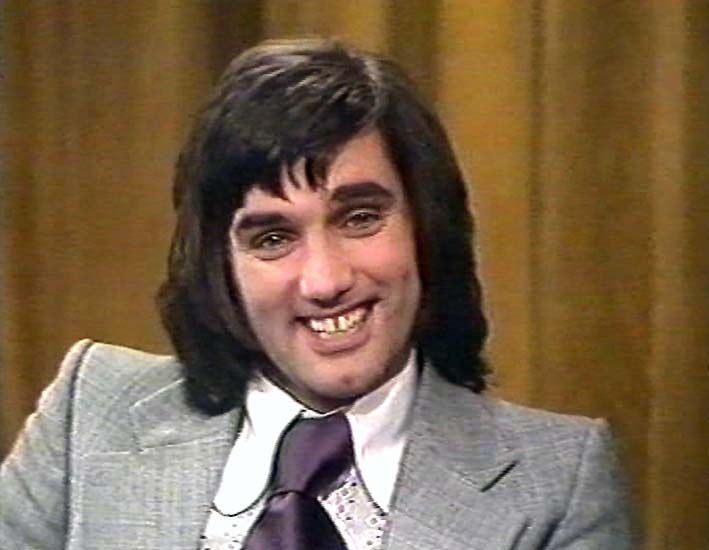
THIS IS YOUR LIFE - George Best, footballer, was surprised by Eamonn Andrews while attending a fashion show at a restaurant in London's West End.
George, who was born and raised in Belfast, Northern Ireland, was offered a trial with Manchester United after the club's scout Bob Bishop spotted him at the age of 15. Having made his first team debut in September 1963, aged 17, he won two League titles and the European Cup for the club. In 1968 he was named the European Footballer of the Year.
George also played for the Northern Ireland national team, making his international debut in 1964. As the first superstar of the sport, he achieved world fame, and with his good looks, became the first footballer with a pop star image, carrying out modelling assignments and owning a fashion store and nightclub in Manchester.
George Best was a subject of This Is Your Life on two occasions - surprised again by Michael Aspel in February 2003 at Thames Television's Teddington Studios.
programme details...
- Edition No: 309
- Subject No: 310
- Broadcast live: Wed 17 Nov 1971
- Broadcast time: 7.00-7.30pm
- Venue: Euston Road Studios
- Series: 12
- Edition: 1
on the guest list...
- Matt Busby
- Frank O'Farrell - in audience
- Anne - mother
- Dick - father
- Carol - sister
- Barbara - sister
- Ruth Daniel
- Hugh 'Bud' McFarlane
- Bob Bishop
- Eric McMordie
- Mary Fullaway
- Cathy McGowan
- Pat Booth - in audience
- David Sadler
- Julia - sister
- Grace - sister
- Elizabeth - grandmother
- Mary - grandmother
- James - grandfather
- Ian - brother
related appearances...
- Bobby Charlton - Nov 1969
- Matt Busby - May 1971
- Michael Parkinson - Nov 1978
- Emlyn Hughes - Feb 1980
- Pat Jennings - Nov 1983
- Nobby Stiles - Nov 1991
- Bob Wilson - Nov 1998
production team...
- Researcher: Jack Crawshaw
- Writer: Jack Crawshaw
- Director: Margery Baker
- Producer: Malcolm Morris
- names above in bold indicate subjects of This Is Your Life
second tribute
tackling football's top names
Manchester United's finest
surprised again!
the producers who steered the programme's success
New producer Malcolm Morris reveals more behind-the-scenes secrets
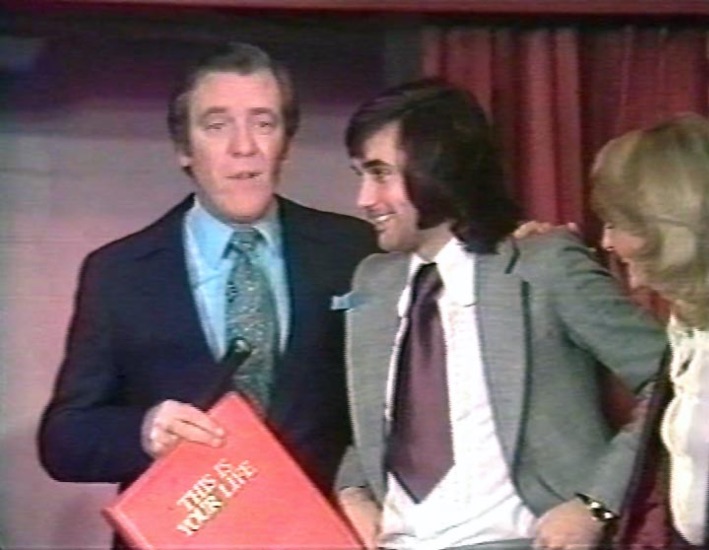
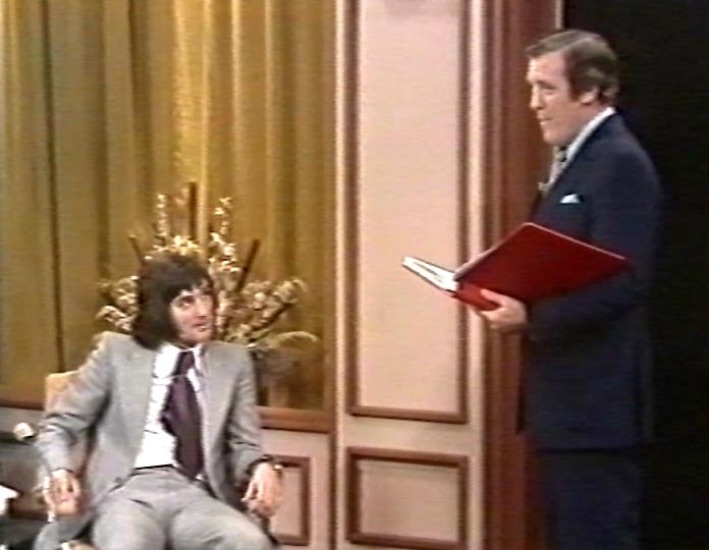
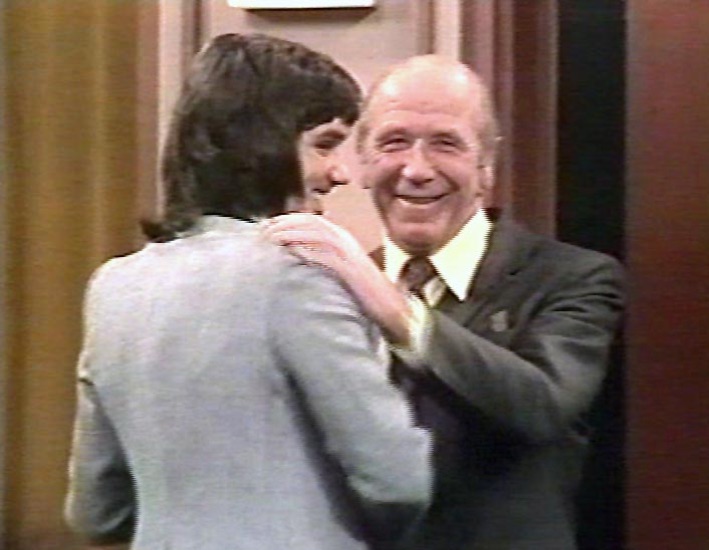
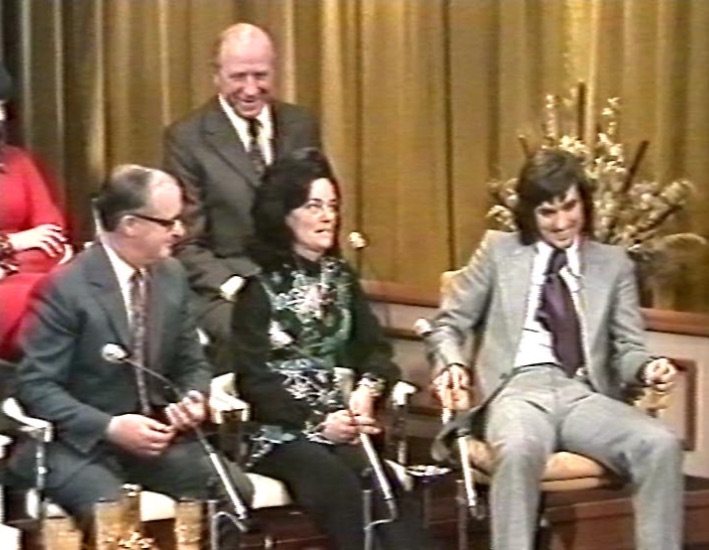
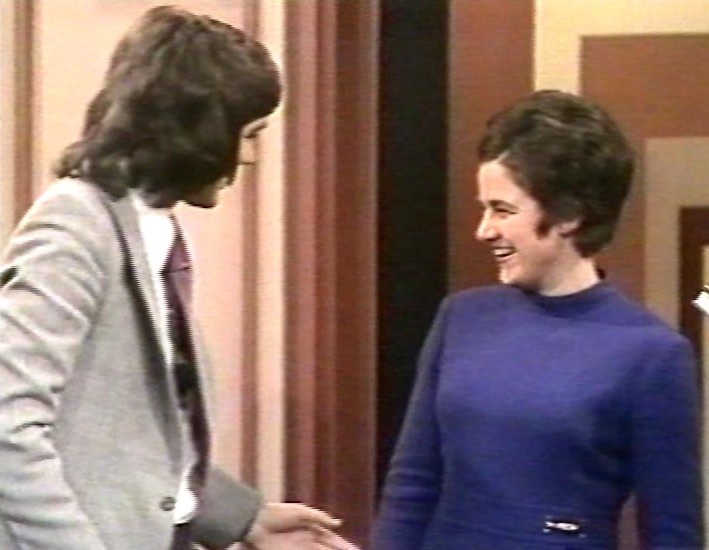
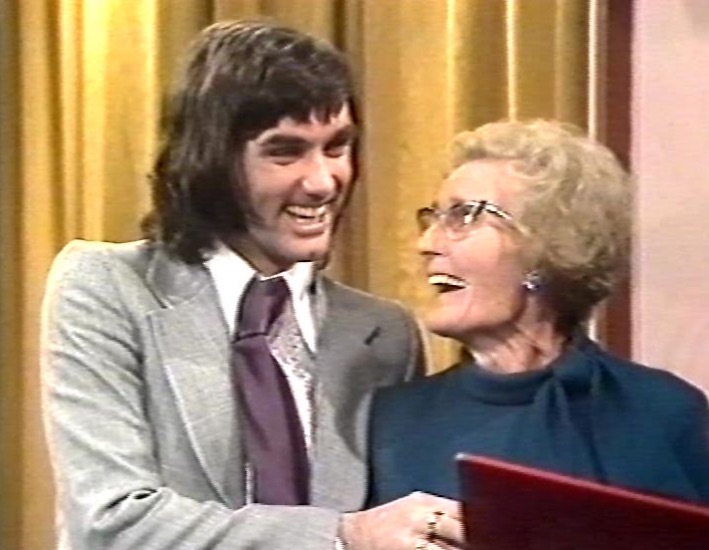
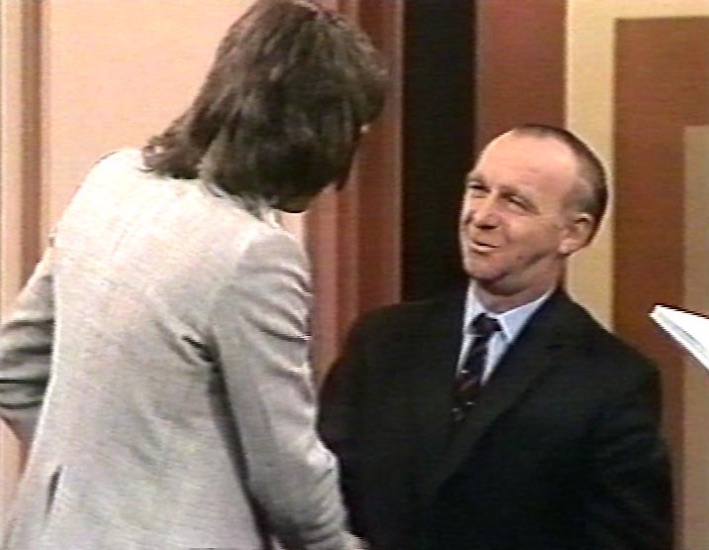
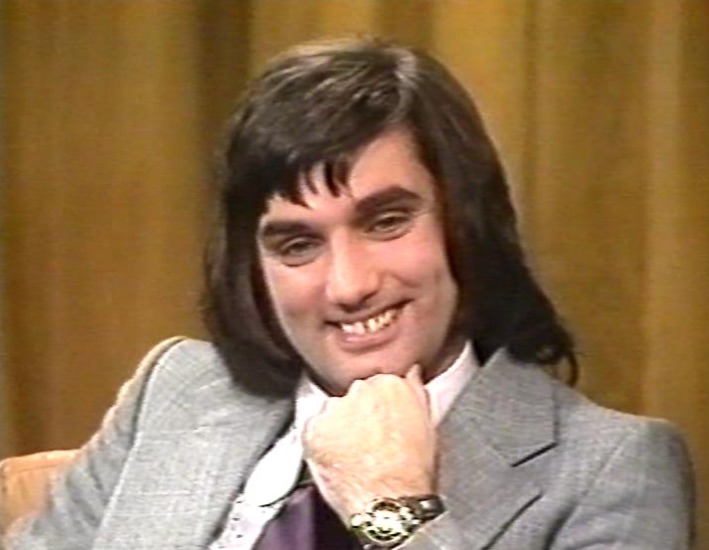
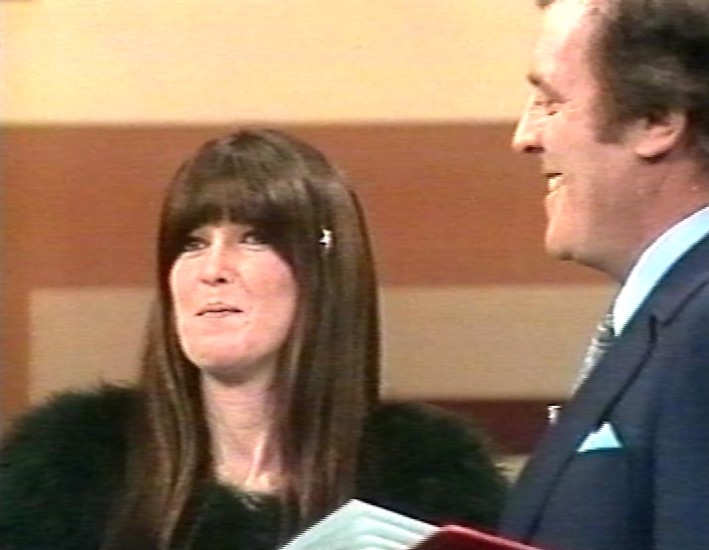
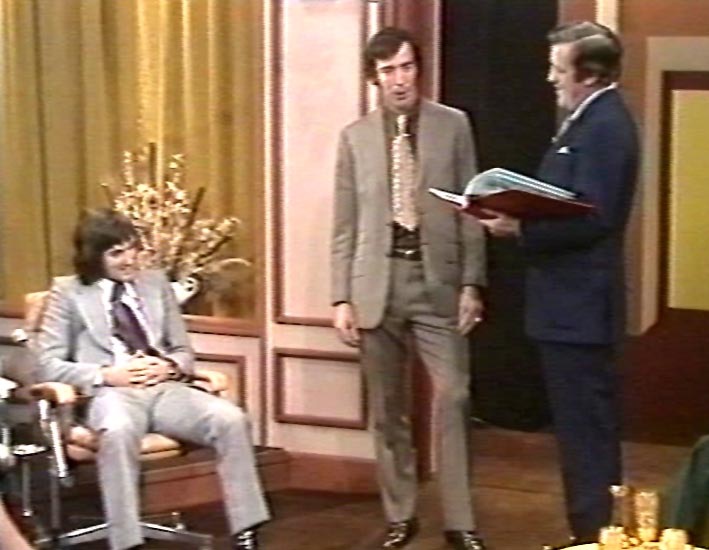
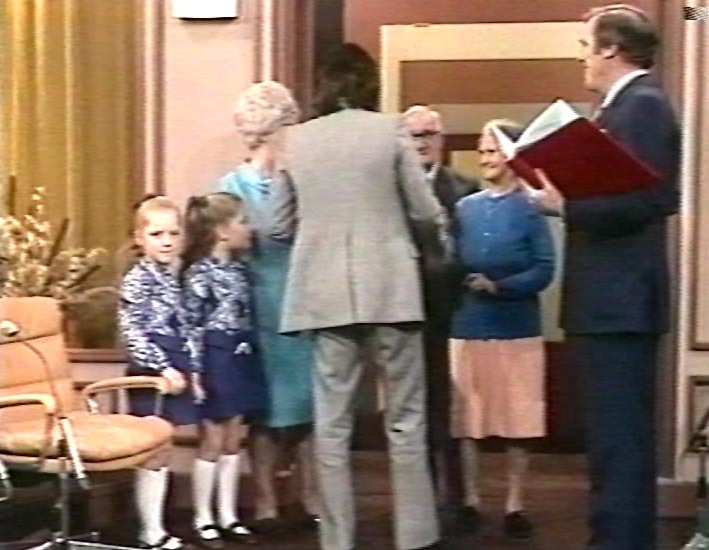
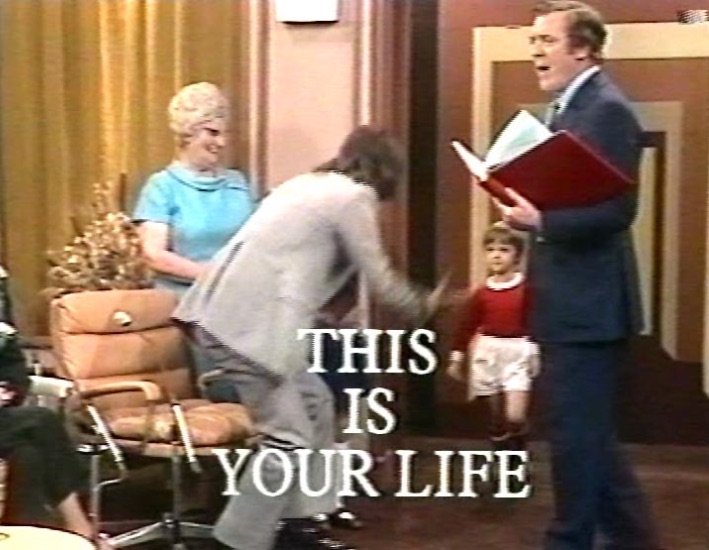
Screenshots of George Best This Is Your Life

Ironically, it was in November that I was chosen as the subject of the television programme, This Is Your Life. This was your life, George Best, might have been more appropriate considering the months that followed. But in November, as far as the public was aware, I was riding high. The goals hadn't yet dried up, and people were already voting me as Sportsman of the Year in The Daily Telegraph's poll ahead of Princess Anne, Jackie Stewart and Muhammad Ali. I'd won this title once before, in 1969, but after the ups and downs of 1971, winning it a second time brought me more satisfaction. Her Royal Highness got the better of me, though, when it came to the BBC television Sports Personality of the Year. But, as some wit joked before the programme, they weren't going to let some little Irish footballer come out on top of a princess on television, were they? So I had to be content with second place.
Because This Is Your Life is supposed to come as a surprise to the personality involved, I was lured down to London on the pretext of hosting a fashion show. And just in case I felt like disappearing, Waggy was there to make sure I was in the right place at the right time, even if a late-night visit to Tramp did bring back memories of another time he tried to keep tabs on me. This time, though, all went according to plan, and I'm glad it did. It allowed me to experience the warmth people felt for me. A feeling that sent a chill down my spine; one that was both frightening and gratifying. I experienced it again many years later when I went back to Ireland to open a building society office in a little village; the sort of occasion when you expect maybe a hundred people to turn up. But this day it was like the coming of the Messiah. They were there in their thousands; all ages. Many of the kids had probably never seen my play, and I'm sure some of the lovely old dears had never watched a football match in their lives, except on television. Yet there they all were to greet me. Not because I was a footballer; they don't look at me like that any more in Ireland. I'm some kind of cult figure to them and, in a nice way, they feel they own me. I'm part of them and I always will be; that's what they feel and that's the way I feel. Something of that was there when I appeared on This Is Your Life.
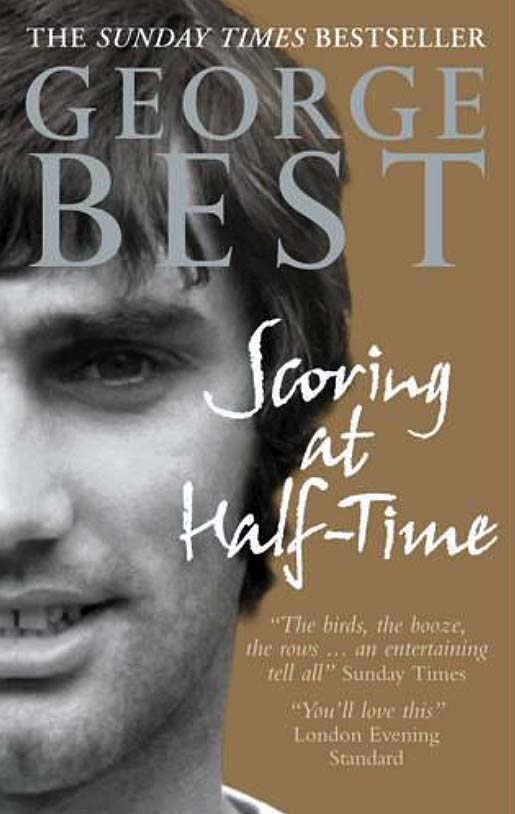
Perhaps the most rewarding television I have ever done has been the two This Is Your Lifes where I have been the subject. The first was in 1971 when I was only twenty-five and the second was thirty-two years later, in 2003. I had no idea either time that anything was afoot. In fact only a few weeks before the second one I was sitting at home watching Michael Aspel pounce on someone with his red book when I remarked to Alex's family, 'They'll never catch me with that one again.'
Of course, at that time everyone in the room except me knew I was about to be captured. They caught me very easily by simply asking me to film an appeal for the Liver Foundation with Professor Williams, something they knew I would not turn down, and therefore I went to them and a waiting audience and guests at Teddington Studios. It was a lovely day and I thoroughly enjoyed it although I did reflect poignantly afterwards on those who featured in 1971 who were not around this time. My mum most obviously and painfully, but also my nans, my old landlady Mrs Fullaway, Sir Matt Busby and not forgetting presenter Eamonn Andrews himself. I was astounded though that the producer Jack Crawshaw who was on the first one was still there thirty-two years later. And they say there is no job security in this day and age. I am particularly pleased about the second one because, rather than making a programme celebrating my life, I'm sure plenty of television companies had my obituaries ready to use at very short notice – a sort of This Was Your Life.
The first programme though caused everyone except me a great deal of stress. At the time I was knocking around Manchester with a clothes designer named Harold Tillman. Like me he enjoyed the night-life and we drank, played and did bits of business together. It amuses me that people think Manchester only became fashionable with the advent of the Gallagher brothers, Madchester and the 1990s nightclubbing scene. Rubbish. Manchester in the 1960s and 1970s was the in-place, more so than London even. Harold had working for him a certain Paul Smith, now Sir Paul Smith, whose name has become one of the biggest shirt brands of all time. The fashion house they worked for was called Kilgore, French and Stanberry and in the knowledge that I was going to be targeted for This Is Your Life they made me a beautiful suit which was going to be the centrepiece of their latest range. They co-operated in setting me up but at the same time they were ensuring that their product would be showcased on prime-time television. I was told that the new range was being launched to the press following a party at a penthouse flat in London. The idea was that the press launch they took me to the morning after the party would really be the Teddington Studios [Bigredbook.info editor: George was actually surprised in a West End restaurant]. I was assured of plenty of gorgeous women and even more booze at the party. They knew that was the only sure way of making me turn up.
They got me down to the flat near Park Lane in London and I tried the suit on before the party got swinging. There is nothing like a well-cut, made-to-measure, quality suit to make you feel good and once I put it on I did not want to take it off. 'Come on, George, hang it up and leave it fresh for the morning,' urged Harold, mindful though not to arose my suspicions.
I would have none of it and by now guests had began arriving and the champagne was beginning to flow. My boredom threshold has always been low and I also had a fear of enclosed spaces, so before long I was itching to leave the party. I fancied going to Tramps. Whenever I was in London I liked to go there. Johnny Gold, the owner, was good to me and tolerated my more drunken moments and you were always sure to bump into someone interesting. It might be a Beatle, a Stone or a Kink or a Sean Connery or a visiting Hollywood star. Never a dull moment. A girl at the party had a car. It was probably a Mini and she agreed to drive us both to the club. I didn't know it then but as I eased out of the door a look of horror spread across Harold Tillman's face. A great deal of effort and expense had gone into preparing the programme and Harold and others had given Thames Television all sorts of assurances about being able to ensure they'd deliver me. Once I was out in that night air they knew that like a Smith's crisp packet I could blow anywhere. With this unpalatable eventuality in mind they had two private detectives waiting in a car who were watching the door and they followed the young lady and myself to the club. I spotted them but remember thinking to myself that the press should have better things to do.
I cannot recall who was in that night but I do know that shortly before dawn broke, and now incapable of anything, the girl agreed to drop me back at the penthouse. Outside, the private detectives who I thought were press were waiting and followed us. Out of devilment I got the girl to lose them and this she did with ease. I hope the TV people didn't pay too much for them because those 'detectives' couldn't follow a bus. At the flat the party had long finished and even Harold had given up waiting for me. So as not to disturb anyone I flopped on to a sofa and went to sleep.
We all overslept, although in those days none of us kept to conventional sleeping patterns. Harold was up and rushing around, pleading for me to come to the car for the 'launch'. I remember him fussing around my jacket and trousers and worrying about creases. He seemed unusually worried. The upshot was that they got me to Teddington, where Eamonn pounced, [Bigredbook.info editor: George was actually surprised in a West End restaurant] and then promptly kept me locked in a room until the evening when the programme was going to be shot. It crossed my mind to escape if I could, not so much because I didn't want to do the programme, but because I needed the hair of the dog. I did it and enjoyed it but the suit looks terrible. Unfortunately no videos were available then but I do have the commemorative album that the production team present to you and my suit looks like it had been slept in, which of course, it had.
I suppose I'm like anyone else when I watch This Is Your Life. It is a great programme and a durable idea but I am often left wondering why it is so short. Covering someone's life in less than half an hour is difficult. These days I often wonder too just who the person is whose life is being celebrated. I think it's a shame how guests are graded by the size of their celebrity and not by their relevance to the subject, meaning that the final guest is often a big star now who may have appeared briefly in panto with the subject twenty years earlier. (And is Lionel Blair really the great friend of every single person in show business?) In the old days it would be a long lost brother, or dear school friend not seen in quarter of a century. I love it though when a voice comes over the speakers and it is obvious that the subject does not have the foggiest idea who the person is. I was terrified this would happen to me. On the first one it did.
When Nurse Ruth Anderson spoke I went cold and thought I was going to have to pretend to know her but as she recounted her story it all came back to me. As a young child I had to go to hospital to have my tonsils removed and Nurse Ruth took a shine to me. My favourite TV programme at the time was Quatermass and the Pit and she allowed me to stay up and watch it. One night as she tucked me in she gave me a little kiss on the forehead and to my horror this was witnessed by the other boys on the ward who did not leave me alone thereafter. At that age you wouldn't admit to still being kissed good night by your parents let alone a nurse on a general hospital ward and I thanked God the boys who had witnessed this terrible incident were not from my school or my estate. Ironically I need never have been in the hospital in the first place. At the time I was unhappy at school and I tried to kid my mum that I was sick. I used to buy red gobstoppers from the penny sweetshop and suck them until my throat area was visibly red and then complain of a sore throat. Because it happened so regularly my mum became genuinely concerned and took me to the doctor. The doctor, who couldn't identify a malingerer when he saw one, referred me to the hospital and the throat specialist. When she decided I needed an operation to have them removed I was tempted to come clean. But events had overtaken me and I judged going into hospital for two weeks and having an unnecessary operation a lesser evil than confessing to my mum (and then my dad) that I had been deceiving them all this time.
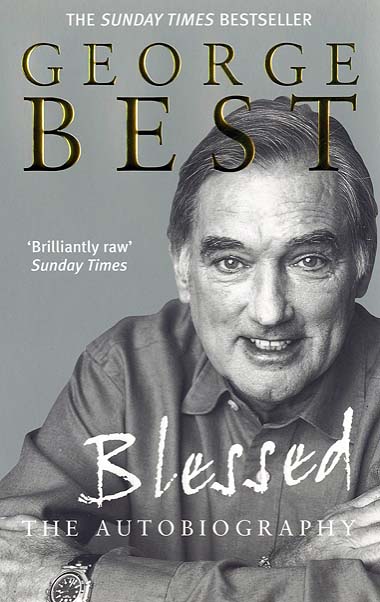
Things got even more surreal a few weeks after the death threat incident when Eamonn Andrews jumped out at me with his little red book on This Is Your Life. I was involved with a clothing company called Lincroft, who had designed a new range of suits which I had agreed to put my name to and we were to announce the deal at a press conference.
That, of course, was where Eamonn was to make his move. And to make sure that I didn't go missing on the day in question – as if – the company arranged a party the night before at a flat in London, with endless champagne and pretty girls with endless legs. The idea was that with everything I might possibly need on tap, there was no reason for me to leave the flat. As an extra precaution, however, they stationed a couple of private detectives outside.
The best laid plans and all that, or in this case the Best-laid plans. Around one in the morning, I decided to take one of the girls to Tramp and, wanting to look good, I put on this new cream suit, which Lincroft had made specially for me to wear at the launch and then the This Is Your Life programme.
When I came out of the flat, I spotted the two 'tecs in their car and thought they were press men.
'Do you think you can lose them?' I said to the girl, who was driving.
She did but lost herself as well before we eventually got to Tramp and spent a few hours there.
Luckily for the detectives, I returned to the flat, with the suit a lot worse for wear. It wasn't the only one.
I was so knackered that I just crashed out, still wearing the suit, which was a real lightweight number that creased easily. The Lincroft people threw a fit when they saw me, wearing something that looked more like a washed-out dishcloth than a new line. Someone got busy with an iron before we got into the studio with Eamonn and, having heard about my exploits the night before, they put someone on every exit door during the recording.
Like most of those programmes, it was a pretty tame show, though I thought they should have called it These Are Your Lives because I felt that I'd lived through a few in the previous 25 years. My family were all there, despite vowing never to go in front of the cameras again after the Cookstown sausages advert. Like everyone else, they were on tenterhooks until I walked in and I remember at the end of the programme, as a final surprise, my little brother Ian walked on, who was just five.
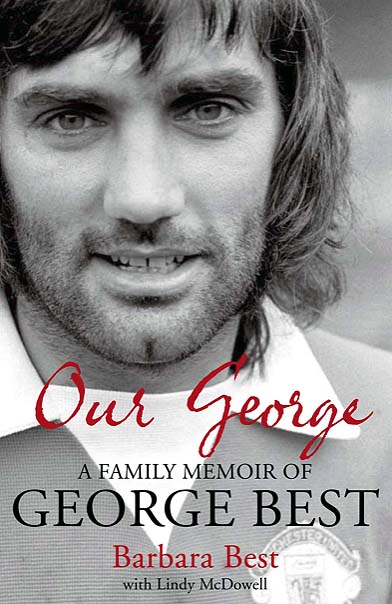
On 17 November 1971 (just six months after Sir Matt Busby was honoured in the same way), George was caught by Eamonn Andrews and his famous red book for the television programme, This Is Your Life.
George often used to boast that he would never be caught out by that particular programme. He used to argue: 'How can someone not find out?' In fact, he himself was caught not once, but twice!
That first time, he was lured to the studios on the pretext of doing a fashion show. The entire family had been flown over – and by that I mean the entire family: Mum, Dad, Granny and Granda Best, Granny Withers and, of course, all of us. Carol was twenty-four, I was nineteen, Julie and Grace were eight and Ian just five.
I remember the researcher Jack Crawshaw coming over to Belfast to chat to us all. At first, I didn't want to go. I had just got engaged and didn't want to be separated from my fiancé, Jim. But in the end I gave in as it was such a special occasion.
Carol had to ask for time off from her job, explaining that she had to go to London. When her boss asked her why, Carol, who because of her Christian principles wouldn't lie, just said, 'I can't tell you.'
He replied, 'Well, if I write it down, will that be okay?'
On a piece of paper he wrote the words, 'This Is Your Life'. Carol just nodded. He was great about it and promised not to breathe a word, and to his credit he didn't.
To be flown to London and put up in a posh hotel for a couple of nights was exciting. We were booked into the hotel under the name of Grant, obviously to try to keep the secret. However, I don't think that it took the staff long to figure it out, especially when my fiancé phoned the hotel and asked to speak to Barbara Best!
The adults were each given £20 expenses, which in those days was a fortune. We weren't really allowed to go very far on our own, though. It was all a bit cloak and dagger. For rehearsals, we were transported to and from the television studios by car, and sneaked in and out, especially on the day of the show when George was in the same building. We even had to be escorted to the toilets.
Anyway, George was caught good and proper. It was such an honour to have been there and so poignant that all of his family were together. That was the last time that he was with us all, together with our grandparents. And after that, it was twenty-eight more years before we were all able to get together again.
One of my favourite memories is of the This Is Your Life programme in which George featured, in March 2003. It was the second time that George was caught out by the show.
Norman and I had told him that we were coming over to visit but had given him the date of our arrival as the day after the show was to be recorded. In fact, we were already in London. Apparently he kept saying to Alex things like: 'When are Barbara and Norman coming? I thought it was today. Give them a ring to see what's happening.' And Alex would pretend to ring and then say our phones must be switched off.
He had been lured to the studio on the pretence of speaking about his transplant with Professor Williams, so you can imagine his complete surprise yet again when he walked out on to the set and we were all there. I'll never forget his face. He just wagged his finger at me, but I think he was really pleased.
The rest of the family were staying in a hotel in London, but Norman and I were going back with George and Alex for a couple of days. When we arrived back at 'The Barn' Alex's mum and dad, Cheryl and Adrian, were there and everyone was in high spirits after such a successful evening. Alex cracked open a bottle of wine. I must admit I was sorely tempted to join her. But Norman and I both thought it wouldn't be fair to George, so instead I made some tea for us and for Cheryl and Adrian.
Unknown to George we had a surprise for him. As he was drinking his tea, Norman said, 'George, I'm sure not many people get presented with two red books in one evening', and handed him the original This Is Your Life book from 1971. We had brought it from Belfast. After that first show, our mum and dad had kept it and treasured it. George was like a child leafing through that book, looking at all the photos of the family. Yet another very proud and moving memory etched in my mind.
Sadly, the two This Is Your Life books, as well as George's certificate from his honorary doctorate at Queen's University and a beautiful scroll which was commissioned for the Freedom of the Borough of Castlereagh ceremony, have since become part of a legal wrangle. They are such an important part of George's history, especially the original book, which contains lots of very special photos of family, many of whom, like my mum and our grandparents, have passed away. We dearly want to bring them back to Northern Ireland.
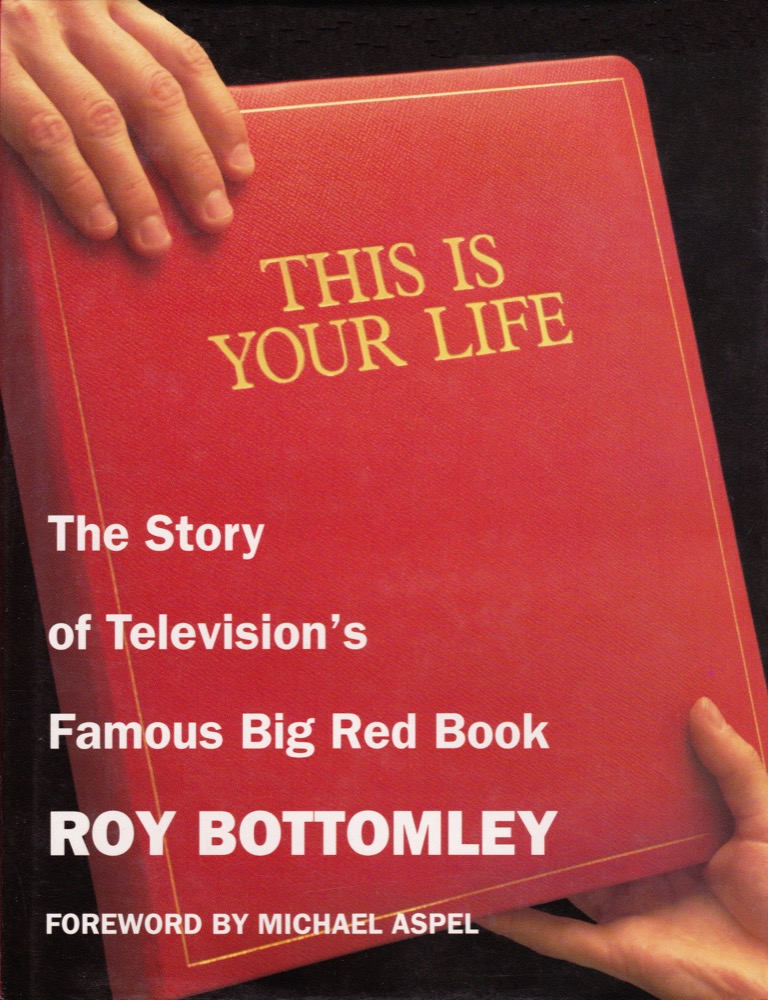
The odds were stacked against us on 17 November 1971, the first show of the second series when 'We return to surprise one of the most talked about people in Britain,' said Eamonn Andrews.
What he might have added was, 'But will he show up?' - for the name on the book was that of Manchester United's George Best, probably the greatest individual player of his time. His pop star good looks made him as popular with the ladies as with the crowds on the terraces.
But even in those days he was not the greatest respecter of punctuality, and we intended going live with the programme. We had gone to great lengths to get George to make an appearance at a fashion show in London. To our relief, he showed up and was blocked by Eamonn's tackle.
The shipyard worker's son from Belfast was spotted by United 'scout' Bob Bishop who described the youngster as 'just over five feet tall and seven stones, wet through'.
He crossed the Irish Sea at fifteen to join United - wearing his first pair of long pants. Then he felt homesick and ran back to Belfast. He was coaxed back, made the first team at seventeen and, in 1966, after United's European Cup win over Benfica, in which Bobby Charlton scored two goals, he earned the title 'El Beatle'.
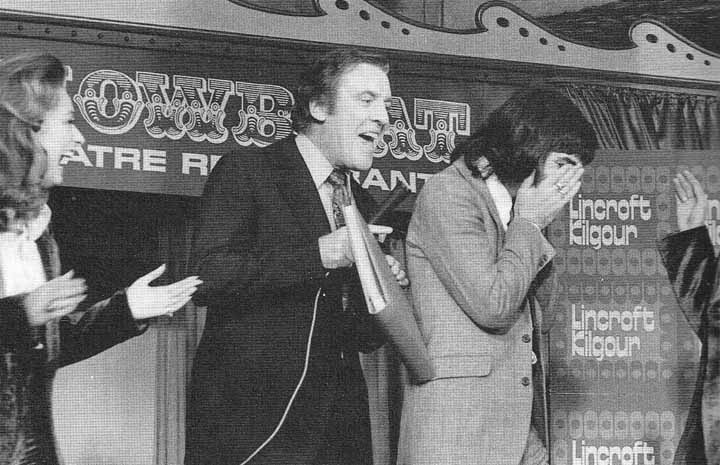
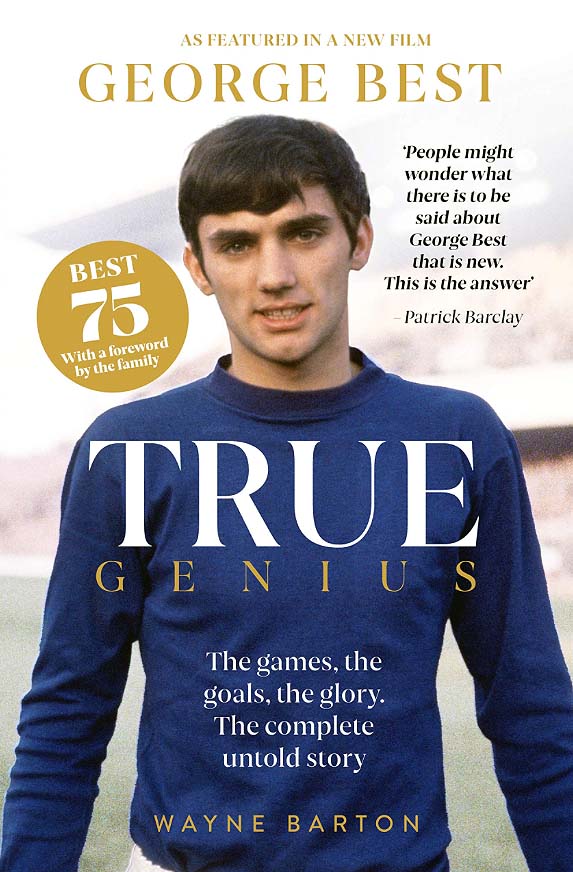
Best was going to need support. The last thing he needed was even more personal attention. It was good-natured - television host Eamonn Andrews approached George to invite him to appear on This Is Your Life, a biographical show where the subject would be greeted with notable people from his past and present. It was not a good time for George to be on the programme for numerous reasons - although he did participate with good humour.
The first reason was that, following the threats of October, he was struggling to comprehend why people would behave with such maliciousness. The second reason was that by his own admission he was starting to feel like two people; the man that he was and the celebrity and personality the public thought they knew. Another reason - the premise of the show was to reunite you with people you haven't seen for a while. The intention was often to surprise. You wouldn't know who Andrews was going to bring on to the stage next.
George already had a skeleton in his closet that he was struggling to deal with; one can only imagine the unsettling reaction a person could have when told they are going to be on a show where such things will be revealed in front of the nation. Andrews' show was far from malicious, but it's easy to consider George's potential anxiety over it. This was compounded by the fact he was treated like a child - the studio arranged a party in London the night before with limitless champagne and lots of women so that George didn't go anywhere else, while they also hired two men to follow him just in case he did.
In the late winter of 1971 it could be argued George was a passenger in his own life, only able to assume control when on the pitch. Of course, he had not seen cause to change his lifestyle either. He was drinking more often - sometimes even breaking his own golden rule of not doing so on a Friday before a game. He was even being encouraged to do so, as exampled by the This Is Your Life episode.
The reason most people knew George was because he had moved to Manchester, became a professional footballer, and became one of the most famous footballers in the world. That's why Sir Matt Busby got to know him. When considering the most apt way to summarise Busby's fondness for George, there's perhaps no better quote than the statement he made on This Is Your Life in 1971.
"In any era there are geniuses come along, whatever phase of life you're in," Busby said. "Every century a super-genius comes along. And this is what George Best is in football today. If you just look at the two feet there. They pass the ball, they dribble the ball, they shoot the ball, and of course he's got this appetite for the game. He's got all the quality of balance which is phenomenal. He's very good in the air. A tremendous heart. Most important of all he's got a great temperament. There are periods of matches just before kick-off where players are kicking the ball and getting all excited. George will be in the comer reading the programme as if it's a Sunday school meeting. George Best is a football magician."

In November 1971, it was Best's turn to appear on This Is Your Life. At times, the long-running TV show could be cringeworthy, wooden and two-dimensional. Yet, amidst all the '70s ephemera of the guests - the kipper ties, the fog of cigarette smoke, the flowing evening dresses and the pastel-coloured synthetic fibres - the two worlds that Best inhabited were laid bare. The player was sprung by host Eamonn Andrews (with his trademark lopsided grin) at a fashion show in London. Throughout the episode, Best appeared shy, articulate and a dutiful son, grandson and brother, delighted to see his family. Some great Best anecdotes featured in the show. For example, the story about how his tonsils were removed after his habit of sucking red wine gums to convince his mother that he had a sore throat and needed to miss school backfired. And how United scout Bob Bishop - who discovered Best - scoffed, 'He was no Goliath,' after seeing the frail Ulsterman play for the first time.
However, there was a darker undercurrent. By 1971, Best's trips home to his native Belfast were becoming rarer, and, like her son, Ann Best was firmly in the grip of alcoholism. She was dead within seven years of This Is Your Life going out, unable to cope with the notoriety that her increasingly errant son's antics in England brought on the family. By the time the show aired, the 25-year-old Best had been ordered by United manager Frank O'Farrell to vacate his Cheshire bachelor pad with its sunken bath and snooker room, which he sold for £40,000 before moving back into digs with his former landlady Mary Fullaway.
Although United were flying high at the top of Division One under new manager O'Farrell, trouble was obviously brewing. Eamonn Andrews referred to the 'distraction of London's social scene'. By now, Best and chums were catching the last train from Manchester Piccadilly on a Saturday night, decamping to London and partying the night away at exclusive nightclubs like Tramp. In January 1971, Best - in an episode which became known as his 'lost weekend' - went missing on the eve of an away match against Chelsea and hid at the Islington flat of Irish actress Sinéad Cusack whilst a media frenzy developed outside. 'It was surreal watching TV footage of the outside of the flat I was sitting inside,' Best told me. In 2018, Best's 'lost weekend' was dramatised for the play Hello Georgie, Goodbye Best, which opened in Belfast's Strand Arts Centre, with actor and co-writer Robbie Martin describing Best's life as a 'Shakespearean tragedy'.
Frank O'Farrell, appointed manager in July, contented himself with a self-conscious wave to his star player during This Is Your Life, allowing Busby to do all the talking, which spoke volumes for the power still wielded by Busby - by this time a director at Old Trafford. Best had received a death threat from the IRA in the run-up to United's game at Newcastle in October after the Best family was wrongly accused of making a £3,000 donation to the Ulster Unionists. He rarely made political statements, though he admitted in The World of Georgie Best that, had he remained in Belfast, he might have 'become one of those Protestants who throws stones at Catholics'. As Best told me,
'What they said about the donation to the Unionists was a lie. But in the early '70s it was a lie that could have got me shot. I was scared witless at Newcastle, although I scored the winner and kept running all game because I thought I'd be harder to shoot if I was a moving target. The police told me I was the first British footballer they knew of against whom a credible death threat had been made.'
In the wake of the death threat, Best's form, and soon that of United, went into freefall. Unbeknownst to O'Farrell, Best, who'd netted eleven goals in their first fourteen matches of the season, had already enjoyed the last purple patch of his United career. His appearance on This Is Your Life was also the last time that the player would be together with his extended family.
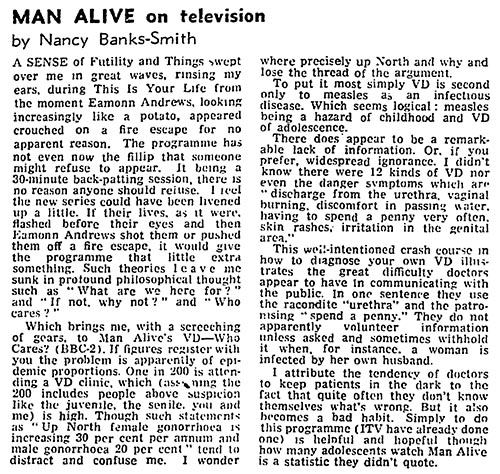
The Guardian 18 November 1971
by Nancy Banks-Smith
A SENSE of Futility and Things swept over me in great waves, rinsing my ears, during This Is Your Life from the moment Eamonn Andrews, looking increasingly like a potato, appeared crouched on a fire escape for no apparent reason. The programme has not even now the fillip that someone might refuse to appear. It being a 30-minute back-patting session, there is no reason anyone should refuse. I feel the new series could have been livened up a little. If their lives, as it were, flashed before their keys and then Eamonn Andrews shot them or pushed them off a fire escape, it would give the programme that little extra something. Such theories leave me sunk in profound philosophical thought such as "What are we here for?" and "If not, why not?" and "Who cares?"

The Times 11 January 1972
By a Staff Reporter
George Best returned to Old Trafford yesterday to face the music. Absent from the club for a week and from the team that were beaten by Wolverhampton on Saturday, he submitted to a "frank" conversation with Mr Frank O'Farrell, the club manager.
His misdeeds were such that a complete rupture between player and club may have seemed possible, but Mr O'Farrell, no doubt after consulting the father figure of the club, Sir Matt Busby, settled for one more chance and a string of disciplinary measures: They were:
Loss of salary for two weeks. (This is thought to be about £400 in Best's case.)
The loss of five days off. (Usually the players are allowed Mondays free. Best will now have to report for training on such days until his penance is served.)
Training both mornings and afternoons this week. (Other players will report only in the mornings.)
A return from his home in Cheshire to the council house lodgings where Best was staying before getting special permission (for an unmarried player) to live privately.
Mrs Mary Fullaway, his landlady, confirmed yesterday that Best's room was waiting for him. When he left he had said that he proposed to retain the room so that he could always come back. She thought she would be able to talk to him "like a second mum".
Followers of the ITV's This Is Your Life series may recall Mrs Fullaway's appearance in one such programme. A brief passage was replayed yesterday on the ITV programme Today.
Mrs Fullaway, it seems, regarded Best as a "bit of a gourmet". From fish and chips he had graduated to Steak Diane and taken her to a restaurant to discover how it was cooked. She had warned him that in her little kitchen they could burn the house down. But she "had a try, poured brandy on the steak, stuck it in the oven and hoped for the best - and he liked it!"
Series 12 subjects
George Best | Alfred Marks | Rolf Harris | Don Whillans | Sacha Distel | Les Dawson | Doris Hare | Keith Michell | David FrostBarry John | Michael Flanders | Charlie Williams | Ginette Spanier | Hughie Green | Tom Courtenay | Hylda Baker
Gordon Banks | Alan Rudkin | Michael Wood | Graham Kerr | Pauline Collins | Ray Illingworth
Patricia Hayes | Nosher Powell | Richard Briers | Lulu